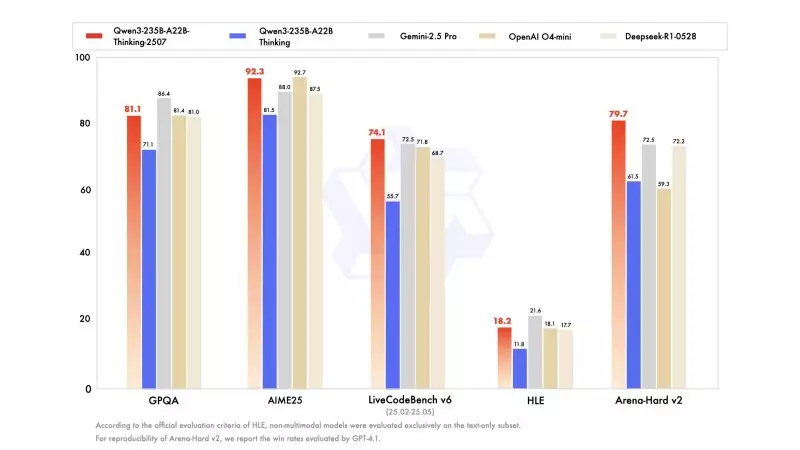In the rapid and fiercely competitive world of artificial intelligence, breakthroughs often are measured by their ability to push boundaries, improve reliability, and democratize access. Alibaba’s Qwen team has confidently positioned itself at the forefront of this movement with an unprecedented series of releases that challenge the dominance of well-established proprietary models. The recent rollout of multiple open-source models—culminating in the exceptional Qwen3-235B-A22B-Thinking-2507—signifies not just incremental progress but a seismic shift in how AI can be developed, deployed, and scaled across diverse sectors.
What sets Alibaba apart is not solely the technical sophistication of these models but their strategic commitment to openness. While many leading AI companies guard their innovations closely, Qwen’s release under the permissive Apache 2.0 license unlocks a new paradigm: full adaptability, transparency, and sovereignty for organizations worldwide. This approach democratizes power in AI, enabling enterprises to tailor models to their precise needs without being beholden to proprietary restrictions or API limitations. In essence, Alibaba is rewriting the rules of engagement in the AI arena—making high-performance models accessible, modifiable, and cost-efficient.
Beyond Benchmarks: Disrupting the AI Power Balance
Most conversations surrounding AI advancements focus heavily on benchmarks, often measuring progress through mathematical and logical problem-solving metrics. Alibaba’s newest models, however, demonstrate a conscientious understanding that true AI excellence isn’t merely about scores but also about usability, robustness, and strategic versatility. Qwen’s latest models perform exceptionally well on standard benchmarks like AIME25, GPQA, and Arena-Hard v2—proving they can handle complex reasoning, GPT-class comprehension, and subjective judgment tasks effectively.
Yet, their true power lies in their design philosophy. The decision to deploy separate models tailored for reasoning and instruction significantly enhances their operational clarity. Instead of juggling a hybrid model that struggles with consistency, Alibaba’s approach allows each model to excel within its domain. This level of specialization underscores a profound understanding: intelligent systems should be built with purpose, not just raw power. When models are optimized for their respective tasks, the result is more accurate, reliable, and adaptable AI—qualities that enterprise users demand for mission-critical applications.
Furthermore, the release of models like Qwen3-Coder-480B and Qwen3-MT broadens the scope to coding automation and multilingual translation—further reinforcing Alibaba’s vision of versatile, comprehensive AI ecosystems. These models are engineered not only for performance but also for practical deployment, with long-context capabilities and domain customization, making them prime candidates for real-world enterprise use cases.
License Flexibility and the New AI Power Dynamic
One of the most revolutionary aspects of Alibaba’s approach is its commitment to open licensing. Unlike many proprietary models locked behind API paywalls, Alibaba’s models, released under Apache 2.0, are fully open for commercial and self-hosted use. This move empowers organizations of all sizes to own their AI infrastructure, minimizing dependency on cloud providers and eliminating unnecessary latency or privacy concerns. For companies wary of data leaks and operational constraints, this represents an unparalleled advantage—a chance to build, adapt, and control their AI assets in-house or within secure cloud environments.
The flexibility extends beyond licensing. The models are designed with compatibility in mind—supporting popular frameworks, open-source toolchains, and deployment strategies. Whether integrated into existing systems or run locally, these models cater to a broad spectrum of technical expertise and infrastructural capabilities. Pricing, too, is transparent and accessible, offering significant value for organizations that seek scalable, high-performance AI without exorbitant costs or vendor lock-in.
This strategic stance not only challenges the conventional “black-box” dominance of API-driven AI but also seeds a more competitive and democratized future. When organizations can modify, tune, and tailor models without restrictions, it stimulates innovation, drives down costs, and enhances security—an approach that could fundamentally reshape enterprise AI adoption.
The Future of Open-Source AI: A Race for Sovereignty
Alibaba’s move epitomizes a broader philosophical shift in AI development—one that favors open, community-driven innovation over proprietary lock-ins. By releasing robust models that meet and exceed industry benchmarks and doing so with licensing that encourages widespread adoption, Alibaba champions a future where AI sovereignty is accessible to all.
This vision resonates profoundly with enterprises seeking dependable, customizable, and transparent AI systems. The open-source ecosystem they foster accelerates research, invites collaboration, and significantly reduces entry barriers for sectors previously hindered by high costs and restrictive licensing. Alibaba’s approach is both pragmatic and visionary: producing models that are technically competitive and strategically aligned with the evolving landscape of responsible, controllable AI.
In an era where AI’s influence continues to permeate every facet of society—from automation and customer service to critical decision-making—such leadership casts a long shadow. By putting open-source, high-performance models in the hands of the global community, Alibaba is not merely participating in AI’s evolution—they are actively shaping its future. A future where AI is truly a tool of empowerment, control, and innovation, rather than a closed and inaccessible technology reserved for a select few.

